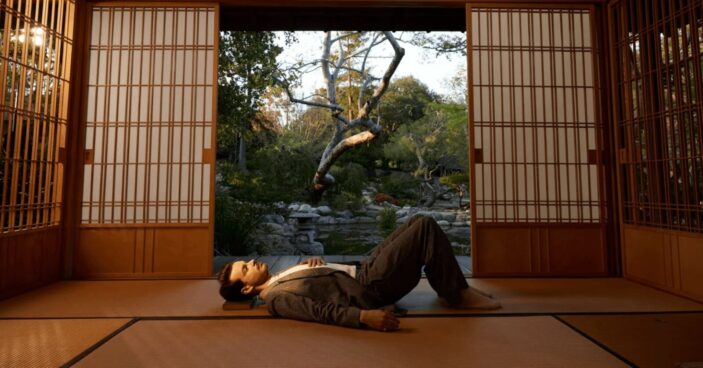
The music of English singer-songwriter Alexander James O’Connor, better known as Rex Orange County, has always felt like a taste test: love at first listen or not for you at all. The 26-year-old musician’s indefinable genre fusion, best described by Google as jazz, hip hop, bedroom pop, indie rock and lo-fi soft rock is arguably an attempt to define an artist whose work lives outside the lines. Somehow vaguely familiar yet utterly individualistic, Rex is a melancholic, introspective Gen Z Randy Newman. His work a contortion of frank poetry and bittersweet piano, suited to a classic Hollywood film soundtrack and an abstract spoken-word poem at the same time. If you connect with it, you’ll love it; if not, you’ll find it hard to grasp.
With the release of new album The Alexander Technique this week, Rex leans fully into the quirky idiosyncrasies that make his music so unique, for good and for bad. Delivering a record that I think defines Rex Orange County, this 16-track album is awash in the staples of deep introspection set to soft piano and guitars with offbeat deliveries and melodies. Long-time listeners will appreciate the appetite this album has for its indulgences, though newcomers might find the absence of hooky crowd-pleasers a bit difficult. For what its worth though, The Alexander Technique is certainly undiluted and 100% of what it means to be.

Opening the album is “Alexander”, driven by a melancholic piano melody that swims in its sombre atmosphere for a full minute before the vocals enter. The song unfolds through the frustrations of dealing with chronic back pain and the realization that it’s masking deeper emotional struggles. This theme of psychosomatic pain—where physical suffering often reflects unaddressed internal issues—speaks to a broader experience of self-understanding and healing that the album leans into. The blend of vulnerability with frank, dry humour is impactful while Rex’s slightly snarled and exhausted tone fits well for a song about doctors visits. The long intro and lack of melodic hook might be a bridge to far to grab the first time listener, but for fans its like catching up with a friend you haven’t seen in a while.
Following is the far more melodically conscious “Guitar Song” carried by the upbeat guitar stylings suggested by the title. Floating through, this one soars despite not having a dedicated repeating chorus. The folky feel is a great genre switch too, while the complexity of the chords and general song arrangement including a two minute instrumental outro, displays the musicianship Rex is capable of.
“2008” up next grooves along with drum-heavy production and nodding to the influence of Kanye West’s 808s & Heartbreak and Lil Wayne’s Tha Carter III in its lyrics. It’s a nostalgic reflection on simpler times, especially for those who, like Rex, came of age in that era. I feel strange knowing people are now old enough to look at 2008 nostalgically though.
“Therapy” brings a Sunday church organ vibe, fitting for its sermon-like narrative. This one indulges a little too far into open-book territory and has frustratingly great musicality beneath a less inspired vocal delivery. Tunes like these make me wish Rex would wring every drop out of a stronger melody. This frustration is arguably answered in both “4 In The Morning” which features excellent vocalizations and harmonies and “Jealousy” with its smooth bass and strings that earn gold stars.
“The Table” is a lovely open tuned guitar song that typifies my favorite aspects of Rex’s music. Mixing a potent ability to write about simple things while extracting elements of the human condition with surgical precision. Rex manages to hurt you by asking you to consider his kitchen table, pondering its history. When it was a tree, who sat beneath it? Did lovers carve their names into it, and are they still together? Lines like, “At least I got more out of it than just somewhere to sit and eat” and “Two folks between coffee, now there’s two more people sat down, on a once-sat-under tree” transform the mundane into something truly lovely.
Later tracks like “Pure” expand the genre list on offer, leaning into pop with playful melodies and a sub heavy kick drum that pulses throughout. “One Of These Days” stands out with its brass and strings, feeling like Rex plucked the house band off the Titanic. A fun cinematic tune, the song feels like both Eleanor Rigby and a 50’s film soundtrack combined. An arguable standout this one’s a favorite. “Carrera” also adds to the pop stylings with a short and sweet two minute bop, though a background effect convinced me someone was cutting wood with a saw in my front yard which is arguably one of my strangest production complaints.
The middle third of this album is a great example of how Rex traverses the musical landscape with ease, not only on a per song basis but within a song itself. “Much Too Much” opens with a beautiful finger picked guitar that gives way to a really surprising Latin lounge music style chorus that is super catchy while “Lost For Words” opens with acoustic guitar that shifts to strings, horns, and eventually a thumping pedal steel country vibe. If that wasn’t enough, “Sliding Door” returns to scheduled broadcasting with a lovely, tender piano number to add a full stop to the genre tour on this part of the album.
Nearing the end, “Look Me in the Eyes” featuring James Blake delivers one of the album’s most emotionally raw moments. The song’s writing is especially strong, focusing on the insecurities of lost love. Lines like “Look me in the eyes, if you’re gonna lie, look me in the eyes if you’re gonna flee” mix with lyrical daydreams of meeting an estranged lover someday down the road. This one is a bittersweet tune with strong lyrics and tender performances from both singers and will probably be a big favorite to many.
The album closes with “New Years,” a reflection on failed resolutions, and “Finally,” a fitting conclusion to an album that defines Rex Orange County at his most introspective.
Ultimately, The Alexander Technique showcases Rex Orange County’s growth as an artist, but it also highlights some of the contradictions in his style. On one hand, the musicianship throughout the album is undeniably impressive, with intricate arrangements and genre-bending experimentation that speak to his maturity and confidence. Tracks like “Guitar Song”, “One Of These Days” and “Pure” demonstrate his ability to craft complex, layered compositions and an effortless ability to dip into different moods and styles. However, this musicality can sometimes outshine his lyrical and melodic choices. While Rex has always embraced a certain rawness in his vocal delivery and lyrical style, there are moments on the album where the music feels more refined than the lyrics and melody, making some tracks feel unbalanced. His more abstract or unconventional melodic choices, though modern and unique, occasionally fall short of the emotional payoff of more traditional approaches.
The album also feels indulgent in places, which is not necessarily a criticism—after several successful albums, Rex is entitled to indulge. Longtime fans will likely relish the deeper dive into the introspection, but for newer listeners, this might not be the easiest entry point into his discography. The Alexander Technique demands patience which can be a tough sell in the second screen economy.
One of the albums greatest strengths though, is how it blends complex, intricate instrumentation with musical arrangements that few contemporary artists pull off so seamlessly. Rex’s ability to fuse genres demonstrates his versatility and willingness to experiment. The album feels like a masterclass in genre-bending, and that fluidity gives the music a sense of spontaneity, allowing each track to stand apart while contributing to the broader emotional arc of the album.
Another standout aspect of The Alexander Technique is Rex’s talent for turning ordinary moments into profound reflections on life. This authenticity is a hallmark of Rex’s work, and it’s especially present here. His vulnerability—combined with a dry, self-aware sense of humor—keeps the album grounded, even when it gets personal.
Overall, while the album can feel dense and challenging at times, it’s also a testament to Rex Orange County’s ability to craft music that remains deeply personal, even when it pushes boundaries. It’s a record that rewards listeners willing to sit with it, offering moments of beauty and reflection. If anything, The Alexander Technique is an album that solidifies Rex as an artist unafraid to take risks, even if not all of them land perfectly.
THREE AND A HALF STARS (OUT OF FIVE)
The Alexander Technique is out now. Listen HERE
